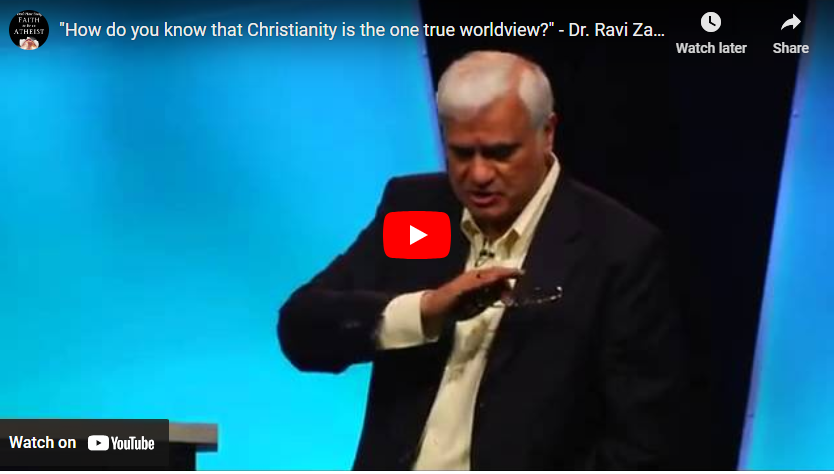In a world filled with various belief systems, religions, and philosophies, one of the most significant questions someone can ask is, “How do we know Christianity is the one true worldview?” This question challenges believers and seekers alike to examine the foundations of the Christian faith and to explore how it stands apart from other worldviews. This blog post will explore the core reasons that set Christianity apart, including its unique claims about truth, the person of Jesus Christ, and the evidence for the resurrection.

1. Christianity’s Unique Claim to Absolute Truth
One of the primary ways Christianity differs from other worldviews is its claim to absolute truth. While many belief systems embrace relativism, suggesting that all paths lead to the same truth, Christianity makes an exclusive claim. Jesus said in John 14:6, “I am the way and the truth and the life. No one comes to the Father except through me.” This statement is clear and direct—Jesus is not one of many ways to God but the only way.
Relativism, or religious pluralism, suggests that all worldviews can coexist and be equally valid. However, this approach is logically inconsistent. If Christianity claims Jesus is the only path to God, and another religion claims there are many paths, both cannot be true at the same time. The exclusivity of Christ’s claim sets Christianity apart and presents a compelling reason for further exploration.
Learn more about how Christian counseling can help you deepen your relationship with Christ and discover spiritual truth.
2. The Person of Jesus Christ
Another key reason Christianity stands as the one true worldview is its unique focus on Jesus Christ. Unlike other religious figures, Jesus didn’t just point the way to God—He claimed to be God. John 1:14 tells us, “The Word became flesh and made His dwelling among us.” This claim is distinct from other worldviews, where prophets or teachers may guide others toward divine truths but never claim divinity for themselves.
The historical Jesus is also well-documented outside of Christian texts. Historians agree on his existence, and His teachings, miracles, and death on the cross are attested to by both Christian and secular sources. However, it is not only His life that matters; His death and resurrection are the cornerstones of Christian belief, which leads us to the next point.
3. The Evidence for the Resurrection
The resurrection is the pivotal event in Christian history and one of the most significant pieces of evidence for the truth of Christianity. No other religion offers such a historical claim—that its founder not only died but physically rose from the dead, conquering death and sin. This event sets Christianity apart from all other worldviews.
Paul wrote in 1 Corinthians 15:14, “If Christ has not been raised, our preaching is useless and so is your faith.” The resurrection is central to Christianity’s truth claim because it provides tangible proof of Jesus’ divine power. There is substantial historical evidence for the resurrection, including multiple eyewitness accounts (more than 500 witnesses), the empty tomb, and the transformation of the apostles from fearful followers to bold proclaimers of the Gospel.
Even skeptics and scholars who have approached the resurrection with doubt often find the historical evidence compelling.
4. The Consistency of Scripture
Christianity is built upon the Bible, which claims to be the inspired Word of God. One of the remarkable features of the Bible is its internal consistency. Written over 1,500 years by 40 different authors from various walks of life, the Bible presents a unified story of God’s redemptive plan for humanity. From Genesis to Revelation, the message of salvation through faith in Jesus Christ remains consistent.
Unlike other religious texts, which often evolve or change over time, the Bible’s core message has remained unchanged for millennia. It offers prophetic accuracy, historical reliability, and moral teachings that have shaped cultures and civilizations.
For more on how the Bible can offer personal guidance, explore spiritual growth counseling to enrich your faith journey.
5. The Transformational Power of Christianity
Lastly, one of the most powerful arguments for Christianity as the one true worldview is its impact on people’s lives. Millions of Christians throughout history have experienced life-changing encounters with God. This transformation is not just intellectual but deeply personal and spiritual. Christians across the world testify to the way Christ has transformed their hearts, healed brokenness, and provided a deep sense of purpose.
In Romans 12:2, we are called to be “transformed by the renewing of your mind.” Christianity offers not only salvation but a complete renewal of the human soul. This radical transformation—seen in countless stories of redemption and healing—points to the truth and power of the Christian message.
Conclusion: Why Christianity Stands Alone
Christianity’s claim to truth, the person of Jesus, the resurrection, the consistency of Scripture, and its transformational power provide strong evidence that it is the one true worldview. While other worldviews may offer wisdom or moral guidance, only Christianity offers a Savior who died for our sins and rose again to give us eternal life. For those seeking the truth, Christianity provides answers that no other worldview can.

